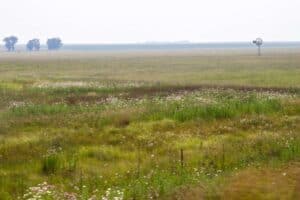The DA yesterday said although they support land expropriation, they do not support it without compensation.

The draft version of government’s new Expropriation Bill, published for public comment yesterday morning by the public works department, has seen stakeholders demanding more clarity and the Democratic Alliance (DA) questioning the timing of the release.
The draft Bill outlines how expropriation, both with and without compensation, will work, and which kinds of property may be expropriated. Its release yesterday started a 60-day public comment period, during which opposition and complaints may be lodged.
The DA yesterday said although they support land expropriation, they did not support it without compensation, and cautiously welcomed the new draft Bill that comes conveniently a few months ahead of the 2019 general elections. DA MP Malcolm Figgs said the timing of the Bill was suspicious because the last time they submitted it, it was also ahead of elections and the president at the time sent it back because it lacked public participation.
“We are suspicious and want to know the reason behind the timing. The draft would need adequate public participation and I don’t believe there is enough time ahead of the elections. “It is also not necessary to change the constitution as the current Land Reform Act is sufficient,” said Figgs.
Constitutional law expert Professor Shadrack Gutto said he believes the whole constitutional reform process was a waste of time and money while expropriation of land for public good was already provided for in the constitution. The professor said there was no need to amend section 25 of the constitution. Gutto said there was a lot of room for expropriation of land for the purposes of reform in the public interest and purpose, saying he could not understand the run-around.
“I think there is a problem. We seem to be going around in circles instead of assessing where we have gone wrong. “Why are we throwing money into a big hole for expropriation of land? I think there is a lot of debate that needs to happen but it is critical that we do not waste people’s time and raise their temperatures by politicising the land question when we can actually move forward,” said Gutto.
He added that the conversation the country should be having now is how to implement policies to empower those that have been given land, so that land is productive and changes lives. AgriSA land head Annelize Crosby demanded clarity on the reach and definitions of the Expropriation Bill.
“Agri SA is opposed to expropriation without compensation. We support the principle that owners should not be better or worse off after expropriation,” she said.
Info
- The Bill makes provision for five types of land to be expropriated. It clearly indicates that no property may be expropriated arbitrarily, for any reason other than public interest, and also indicates when property may be expropriated without compensation. The Bill also gives the authorities the right to use an expropriated property temporarily, for a period up to 12 months.
- The public has 60 days to submit written comments on the Bill to the department of public works.
- It denotes the five following kinds of property as available for expropriation without compensation (EWC):
- Abandoned property: The Bill indicates that zero compensation may be payable in instances “where the owner of the land has abandoned the land”
- Land in which the state has already invested more than the inherent value of the land itself: EWC may be applied if the market value of the land is less than “direct state investment or subsidy”.
- Property where “the land is occupied or used by a labour tenant”: This refers to farms or sections of farms where labourers or their descendants live, in return for labour on the farms.
- Property “where the land is held for purely speculative purposes”: Land which has been acquired for the sole purpose of sale at a higher price, in the event of a market upswing, or other events which may increase future value.
- Land belonging to state-owned enterprises: May refer to tracts of land held by SOEs such as Eskom, Transnet, and others, where land is unused.
For more news your way, download The Citizen’s app for iOS and Android.






